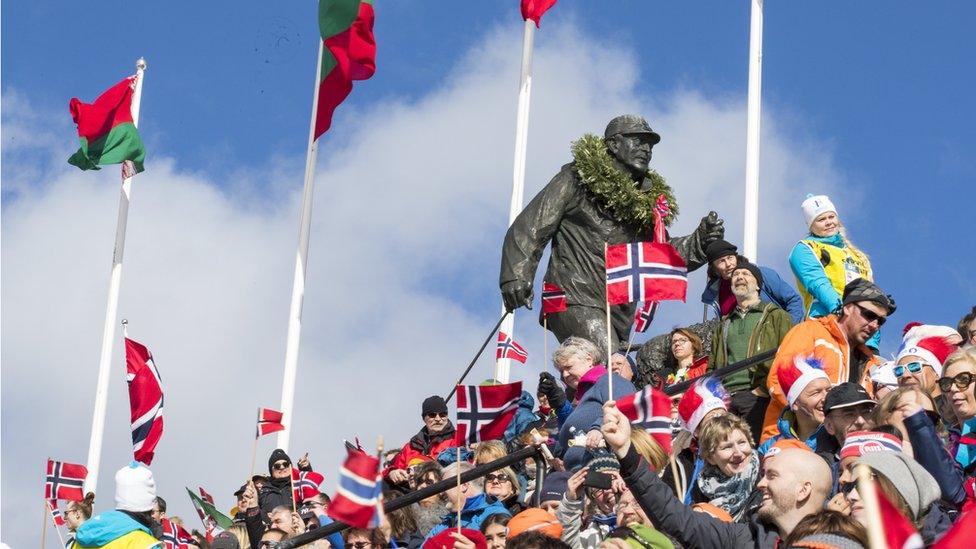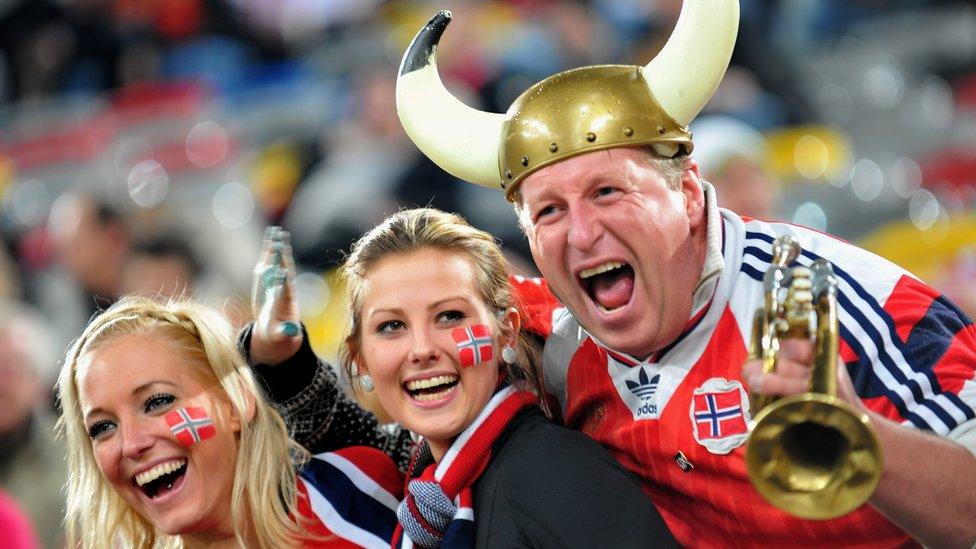Can we be as happy as Scandinavians?
- Published

Sunshine can take a break - the colder Nordic nations are the happiest
On the UN's international day of happiness, Norway seized the coveted title of the world's happiest country from its neighbour Denmark.
But if you look at the underlying data, the margins between the top five - Norway, Denmark, Iceland, Switzerland and Finland - are so small that any of them could have come out on top.
The Nordic countries in particular (Sweden crept in at number 10) consistently top surveys of well-being.
So why aren't we copying them?
It's not the economy, stupid
To begin with, you need to understand what we're measuring.
The World Happiness Report, which compiles the rankings, is completely subjective. It asks people from every nation how happy they feel - there's no solid science to it.
The authors then try and analyse other data - like life expectancy and the economy - to figure out how much each factor contributes to being happy.

The report's rankings are about feelings rather than wealth or health
That might sound a little fluffy for a UN agency report but it's a deliberate attempt to get away from hard numbers.
For decades, we've measured prosperity and success through economic measures like gross domestic product. But that doesn't mean the people in those countries feel happy.
In the United States, for example, income has gone up since the 1960s, but happiness has not. In recent years, GDP has grown - but how happy people are is actually falling.
A job is essential for happiness, but wealth has diminishing returns.
A 2010 American study, external, analysing surveys of 450,000 people between 2008 and 2009, came to the remarkable conclusion that money does make you happier - but only up to a salary of $75,000. After that, extra income makes no difference to your day-to-day happiness (although it can make people feel they're achieving a lot in life).
The authors - who have both separately won the Nobel Prize in economics - suggested: "Perhaps $75,000 is a threshold beyond which further increases in income no longer improve individuals' ability to do what matters most, such as spending time with people they like, avoiding pain and disease, and enjoying leisure."
But if it's nothing to do with economic power, just what are those Nords doing so much better than the UK or US?
From high tax to hygge
Unfortunately, it's not as simple as a policy change. The factors behind Nordic happiness are complex - and some experts doubt it even exists at all.
The economic factors are taken care of - all five Nordic nations are in the top 20 countries in terms of GDP per capita, and have good life expectancy.
What they do with their spending power might have an impact, however.
Danes, for example, pay very high rates of tax - anything up to 51.5% of their income for a high earner.
But that cash is reinvested in society through a range of social programmes - such as free university education, free healthcare, generous maternity leave and unemployment benefits.
"We are not paying taxes. We are investing in our society. We are purchasing quality of life," wrote Meik Wiking, external, CEO of the Happiness Research Institute, in 2016.

Norway took the top spot this year, but Denmark has been a consistent winner for decades
The re-investment of oil revenue in Norway - an "emphasis on the future over the present" was singled out in the announcement that it had taken the top spot in the World Happiness Report.
But such a high rate of tax and can't simply be introduced overnight - and it's only one piece of the complicated cultural puzzle.
The constant success of Denmark in happiness surveys, dating back to the 1970s, has helped to popularise their cultural concept of hygge (that's pronounced "hoo-ga").
In a nutshell, it is the concept of self-care through small, comfortable indulgences, which helps to stave off the long winter evenings.
Advocates say that small acts of self-care are a key part of what makes the Danes - and other cultures with similar practices (like Swedish mys or Norwegian kos) - so happy.
But not everyone is convinced.
Oh, happy Danes
Researchers at the University of Warwick think, external that all the mystery surrounding Nordic - specifically Danish - happiness has less to do with socialism and cosy candlelight and more to do with good hard science.
Andrew Oswald and Eugenio Proto think they have found the answer in Denmark's DNA: that "the closer a nation is to the genetic makeup of Denmark, the happier that country is."
The research is far from certain, but the pair found that Denmark has a particularly high prevalence of one gene variant which is associated with good mood, and a resistance to depression.

Prepare for a rainy day - some experts think expectations matter
But then again, there are some who think the question favours the content.
Michael Booth, author of "The Almost Nearly Perfect People: Behind the Myth of the Scandinavian Utopia" thinks that Danes might simply have low expectations.
"Over the years I have asked many Danes about these happiness surveys - whether they really believe that they are the global happiness champions - and I have yet to meet a single one of them who seriously believes it's true," he wrote in The Atlantic, external.
"Danes do typically expect less than the rest of us, and when their low expectations are fulfilled, so are they."
It's the same conclusion reached by a tongue-in-cheek paper in the British Medical Journal back in 2006, external, which noticed the existence of European statistical data on low Danish expectations.
So, although no-one is quite sure what the key to Nordic happiness is, citizens of other nations can content themselves with the knowledge that it's possibly cultural, genetic, or just made-up nonsense.
That kind of dismissal is unlikely to bother the people there - they're rather happy with how things are, after all.
- Published20 March 2017

- Published2 October 2015
